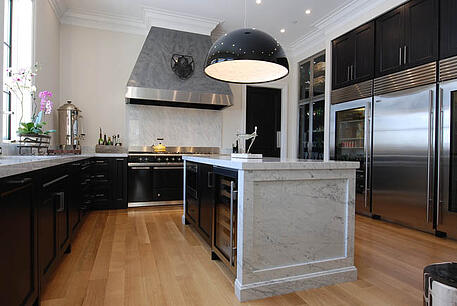 Bamboo and hardwood floors share many of the same characteristics – a warm, high-quality look, a smooth surface and multiple finish options. However, for all that it might look like hardwood, bamboo is actually a reedy plant, and that makes it notably different than its woody, tree-based counterpart.
Bamboo and hardwood floors share many of the same characteristics – a warm, high-quality look, a smooth surface and multiple finish options. However, for all that it might look like hardwood, bamboo is actually a reedy plant, and that makes it notably different than its woody, tree-based counterpart.
The Difference Between Bamboo & Hardwood Floors in a Chicago Home Remodeling Project
Here are some of the main differences to review, between bamboo and hardwood flooring, when planning your kitchen, bath or basement remodeling project. Considering these differences ensures you choose the best and longest-lasting product for your household’s lifestyle.
They’re both hard
The good news is that both products are within the same hardness rating (assuming you’re considering wood options worthy of flooring material) and bamboo is often harder than most species of hardwood.
It’s important to note, however, that darker shades of bamboo are often weaker because the carbonization process required to turn light bamboo to a dark(er) version compromises the bamboo fibers. Thus, if hardness/durability is important to you, lighter bamboo flooring is your best bet.
Bamboo patterns are consistent; natural wood has varying patterns
Bamboo patterns are very consistent, with long, linear striations that are rather uniform in look. While this is great for more modern home designs, where linear and streamlined looks are the norm, traditional, transitional and/or eclectic design enthusiasts might find this boring. The species variation inherent in natural wood options means more varied patterns to appreciate, patterns you can show off with a natural wood finish.
Hardwood shouldn’t be installed below-grade, bamboo can be
Bamboo is more water- and moisture-tolerant than hardwood, and this matters if you’re refinishing or upgrading a below-grade basement. It may also matter to you if you have kids or a bathroom will be used by those who may not be as conscious about immediately sopping up excess water as you would be.
They have identical lifespans
Both hardwood and bamboo flooring options are designed to last roughly 20 to 25-years or more with proper maintenance and care. It should be noted that within this timeframe, bamboo cannot be refinished, while hardwood most certainly can.
Bamboo is more eco-friendly – or is it?
Eco-friendly, or green, remodels get pretty tricky because the term eco-friendly is a mixed bag. Bamboo has risen quickly up the Chicago home remodeling totem pole as the result of its “eco-friendly” attributes – namely that it’s more sustainable to grow and harvest than hardwood since it only takes about three- to five-years to mature.
However, you also need to factor in the fact that bamboo is largely grown and produced in Southeast Asia, meaning it requires significantly more fossil fuel consumption to ship. Similarly, it undergoes more processing than hardwood does in order to be floor-ready, further increasing its environmental impact and CO2 output.
Eco-conscious lovers of hardwood will find it reassuring that using hardwood flooring products with FSC (Forest Stewardship Council) certification means wood is sustainably harvested and ethically sourced. Plus, it probably traveled a shorter distance to get to you.
Bamboo is more moisture-tolerant
As mentioned above, bamboo is more moisture tolerant (although homeowners should still be careful to mitigate moisture and standing water in their homes/floors) than wood. Interestingly, bamboo is also more mold and mildew resistant because its inherent properties make it a more hostile environment in which to grow.
Are you debating whether to install hardwood or bamboo in your Chicago home remodeling project? Contact us here at Kitchens & Baths Unlimited. Our design team is happy to answer all of your questions as we determine which flooring options make the most sense for your home.



